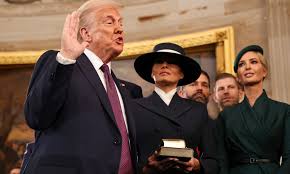By Cheta Nwanze
Donald Trump’s inauguration for his second presidential term has sparked concerns globally, particularly in Africa. Although his speech didn’t directly address African countries, his policies may have profound implications. Here are some implications for key African countries.
Impact on World Peace
Trump’s decisions to broker a ceasefire in Gaza and resume high-level contacts with Russia may reduce tensions in the Middle East and Ukraine. For Nigeria, a reduction in Middle East tensions could lead to increased stability in neighbouring countries, potentially reducing the influence of extremist groups like Boko Haram. As a key player in Middle East politics, Egypt may see improved relations with the US and increased cooperation on counter-terrorism efforts. As Africa’s leading economy, South Africa may benefit from increased stability in global markets and trade.
Global Geopolitics
Trump’s threat to reclaim the Panama Canal could lead to a major diplomatic crisis, straining US-Panama relations and potentially sparking tensions with other Latin American countries. Nigeria, which relies heavily on manufactured goods from other countries, could face disruptions in its supply chains and increased costs due to potential trade tensions. South Africa could also face disruptions in its supply chains and increased costs due to potential trade tensions. Due to geopolitics’ vengeful return, Morocco may need to navigate complex relationships with the US, Europe, and other African nations. As a growing economy, Kenya may face increased competition due to US trade policies, which could impact its agricultural and manufacturing sectors.
Energy and Environment
Trump’s decision to halt efforts to reduce US greenhouse gas emissions and his “Drill, baby, drill” mantra may increase US oil production, affecting global oil prices and potentially destabilising economies reliant on oil exports. Nigeria’s economy relies heavily on oil exports, and potentially lower global oil prices could pose significant challenges. As Africa’s second-largest oil producer, Angola may also face reduced government revenues and increased economic instability. Reduced global demand and lower prices could impact Ghana’s emerging oil industry.

Climate Change
Trump’s retreat from the Paris Agreement could be catastrophic for African countries, which are highly vulnerable to climate-related risks. Nigeria, which is already experiencing the impacts of climate change, including increased flooding and droughts, could face even greater challenges in adapting to a changing climate without the support of global agreements like the Paris Agreement. Ethiopia is one of the countries most vulnerable to climate change, and it may experience increased droughts, floods, and food insecurity. Malawi’s agriculture sector, which employs most of the population, may be severely impacted by climate-related shocks. Somalia’s fragile state and lack of infrastructure make it highly vulnerable to climate-related disasters, giving strength to groups like Al-Shabab as they are likely to see more recruits.
The World Health Organisation
Trump’s withdrawal from the World Health Organisation (WHO) could have far-reaching consequences for African countries. One major concern is the potential disruption of global health initiatives, including programmes to eradicate diseases like polio and measles.
African countries rely heavily on WHO support for their healthcare systems, and a withdrawal of US funding could lead to significant gaps in funding for critical health programmes. For instance, the WHO’s polio eradication programme, which has made significant progress in recent years, could be severely impacted, putting millions of children at risk of contracting the disease.
Furthermore, the withdrawal could also limit access to critical medicines and vaccines, exacerbating existing health challenges in Africa. The WHO plays a vital role in coordinating global responses to health crises, and without US participation, African countries may be left vulnerable to emerging health threats.
The withdrawal could also have economic implications for African countries. Many African countries rely on WHO support for their healthcare systems, and a reduction in funding could increase healthcare costs, which could have a ripple effect on the broader economy.
It’s worth noting that the withdrawal process is complex and may take up to a year to complete. During this time, the US will continue to participate in WHO activities. However, the long-term implications of the withdrawal remain a concern for African countries and the global health community.
Opportunities for Africa
China’s commitment to the Paris Agreement and its expansion of clean energy infrastructure may help African countries transition to renewable energy sources and reduce their dependence on fossil fuels.
Nigeria, which has significant renewable energy potential, could benefit from Chinese investment and expertise in developing its solar and wind energy resources. This would reduce Nigeria’s reliance on oil and promote sustainable economic growth.
Egypt has already begun investing in renewable energy, and it plans to generate 20% of its electricity from renewable sources by 2022. South Africa has set ambitious renewable energy targets, aiming to generate 20% of its electricity from renewables by 2030. Morocco has made significant investments in solar energy and plans to generate 50% of its electricity from renewable sources by 2030.
Of Africa’s major economies, Nigeria is the last to take the renewable energy path. As with so many things Nigerian, the drive for renewable energy is led haphazardly by the private sector. There is an opportunity. Will we take it?
Cheta Nwanze is founder at SBM Intelligence

